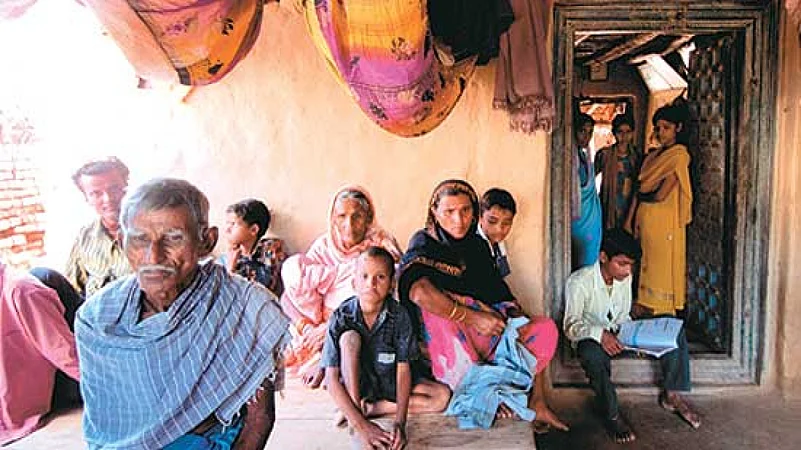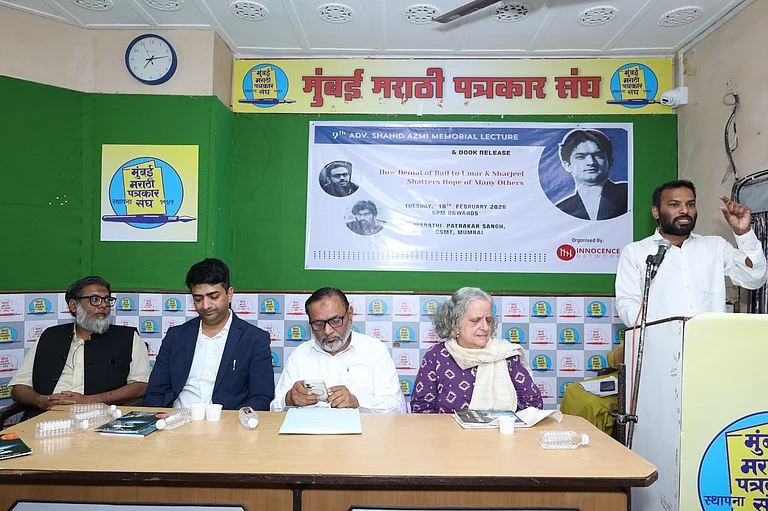Even the silences scream out loud for this family of victims, in a world far, far removed from the high-profile commemorations for 26/11 in Mumbai. “The staccato sound of the gun often reverberates in my brother’s mind, affecting the hearing in his left ear,” says Mohammed Sagir Ansari. He’s talking of 18-year-old Mehboob, who survived with a bullet wound on his left thigh during the attack on Victoria Terminus. Visits to the hospital are not yet over for Mehboob. Six other members of the Ansari family—five men and a woman—weren’t so lucky. They died that night.

Cut deep: Afrooze’s bullet-scarred back
The scars haven’t healed for the surviving Ansari clan. Try looking into the eyes of Mehboob’s younger brothers—Afrooze, 12, and Firoze, 10—who saw their parents being killed and you know the timidity you see will not go away for a long while. Perhaps forever. It’s etched too deep to be easily forgotten. There’s a naked loss of innocence in the way Afrooze describes the terrorist “using his deadly gun like a toy machine gun in the hands of a child”. Actually, everyone in the Ansari family looks much, much older than their age. That’s not surprising: a year after, the edifice of the family is feeling the strain. The fissures are evident.
A visit to the family homestead, at Dhaab village of Bihar’s Nawada district, some 130 km from Patna, is deeply disturbing despite the serene surroundings. On the surface, the physical wounds have healed, but the pain lingers on in many forms in patriarch Mohammed Sahib Ali Ansari’s brick-and-mud-thatched house in this Muslim-dominated village, surrounded by miles of farmland on which grow wheat and paddy, pulses and oil seeds.
Built in the form of cubicles around an inner courtyard that serves as an open kitchen, the sparsely furnished house has clothes hung on strings that act as curtains. Here live Sahib and his wife Zubeida, and the widows and children of two of his elder sons. One died in the Mumbai attacks, the other in an accident in April last year. There is also the family of Israil Khan, Sahib’s third son, who lost his job as taxi driver in Mumbai owing to long absence required to resettle family members and sort out matters related to compensation claims.
As the family gathers in the courtyard serving as a sit-out and work space for milling paddy grown in the family’s one-acre holding, one senses fresh strains in the joint family. “Please talk to my daughters-in-law. Tell them to help with the household expenses. I have lost two of my breadwinning sons and now don’t want to lose them (their support) too,” beseeches 70-year-old Sahib Ali, out of hearing of the young womenfolk. Zubeida, too, points to a collapsed portion of the house that needs repairs to lament the sudden change in behaviour of her daughters-in-law.
In this sorry family picture, it would be pointless to look for villains—the other side’s story is equally distressing. Having lost her husband (in a road accident a week before her daughter’s wedding in April, 2008) and two teenage sons (who were undergoing training in Mumbai) to terrorists’ bullets, Sabra Khatun, 40, has become a shadow of herself, say family members. Her only joy is the birth of a grandson last month. With no sons to depend on, she is guarding her funds to educate her youngest daughter and get her married.
It is amply clear that the compensation family members received from the Maharashtra and Bihar governments as well as the railways is becoming a bone of contention. Both the widowed daughters-in-law are trying to safeguard the funds for their children’s education and the marriage of daughters. Many children scamper around the house—all of them have lost somebody, a parent or two, or a cousin, an uncle, an aunt.
Four people—one from every affected family—have been selected for the promised non-gazetted railway employment promised by former railways minister Laloo Prasad Yadav. So far, only the medical formality has been completed—but only after a bribe was paid. The wait for the promised railway job is adding to the tension as there is fear that large bribes may have to be paid for every job.
Sagir (Sahib’s grandson) is the only one who has so far taken concrete steps to rehabilitate his family by buying a house in Ranchi (using his and his brother Mehboob’s compensation money) and is now getting his three small siblings admitted to schools. As Sagir explains, “How can we go back to Mumbai after we have lost our dear ones there? Twice when I had to go back there for compensation and for closing my embroidery shop, I started trembling as soon as I stepped on the railway platform.” While keen to get a railway job, Sagir is hopeful he will get one far away from any railway station.
It’s clear that going back to Mumbai is no longer an option for the Ansaris. Mumbai has always been the first choice for migrant labour from Dhaab village, which is close to Jharkhand. “There are over 150 people from the 40 homes in our village working and living in Mumbai for the last several decades. It is the money earned there that sustains our families here,” says Israil.
Unlike the menfolk, the women in the Ansari family have so far not ventured out to earn a livelihood. So 30-year-old Shakeela Khatun, whose husband Elias was a cook in Mumbai, is holding on to the compensation money to bring up five school-going children. There are two daughters approaching marriageable age—and a son with a speech problem. Though viewed as stubborn for her decision, Shakeela is clear she wants her daughters to get some vocational training, even as she plans to get her youngest son, Faizan, medical attention.
Similarly for Shehnaaz, the younger sister of Sagir, bringing up four children, including a 13-month-old son whom her husband, a wallet maker, never got to see, seems an uphill task but she holds her grief in check. Tending to her children, she recalls how, during her one visit to Mumbai, she found it “overcrowded”. Now she never wants to visit Mumbai again.
One area where the family is in unison is anger about the delay in meting out punishment to Ajmal Kasab. Despite no television or newspaper at home, the Ansari family keenly follows developments on Kasab’s trial. “He should have been shot down. Why is the government wasting so much money on him,” asks Israil. Then his voice trails away.
By Lola Nayar in Nawada district, Bihar Photographs by Tribhuvan Tiwari


























